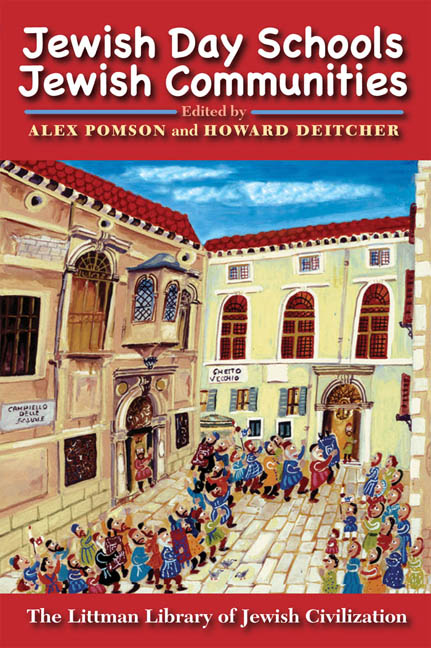Book contents
- Frontmatter
- Dedication
- Acknowledgements
- Contents
- Note on Transliteration
- Introduction: Jewish Schools, Jewish Communities: A Reconsideration
- PART I Insights from Public and General Education
- 1 Building Community Within and Around Schools: Can Jewish Days Schools Measure Up?
- 2 From Control to Collaboration: Mapping School Communities across Diverse Contexts
- 3 Compassionate Conservatism: On Schools, Community, and Democracy
- 4 A Response to Deborah Meier
- 5 Community as a Means and an End in Jewish Education
- PART II Cross-Cultural Insights
- PART III Insights through the Prism of Community
- Contributors
- Index
3 - Compassionate Conservatism: On Schools, Community, and Democracy
from PART I - Insights from Public and General Education
- Frontmatter
- Dedication
- Acknowledgements
- Contents
- Note on Transliteration
- Introduction: Jewish Schools, Jewish Communities: A Reconsideration
- PART I Insights from Public and General Education
- 1 Building Community Within and Around Schools: Can Jewish Days Schools Measure Up?
- 2 From Control to Collaboration: Mapping School Communities across Diverse Contexts
- 3 Compassionate Conservatism: On Schools, Community, and Democracy
- 4 A Response to Deborah Meier
- 5 Community as a Means and an End in Jewish Education
- PART II Cross-Cultural Insights
- PART III Insights through the Prism of Community
- Contributors
- Index
Summary
WHEN I WROTE my friend Miriam to say I was Coming to Jerusalem to talk about Jewish education, she wrote back, and I quote, ‘You? On Jewish education?'
I admit, I had virtually no formal Jewish education. As a Student I went to independent private schools. The schools I have been involved in as a teacher and principal have all been public schools, in the US sense of that phrase, and it so happens they were all schools serving predominantly lowincome African American and Latino students and families, located in largely ghetto communities of colour and poverty. In some of these there was a small white population, and probably half of those were Jews.
So much for my qualifications to address this topic.
On the other hand, I have a strong sense of my Jewish identity, which is connected to my absurd belief that in fact I had a deeply Jewish secular education at the hands of a family that was immersed in New York City's Jewish life as well as its intellectual life. Both of my parents were prominent leaders of Jewish organizations: my father was head of the UJA-Federation for his entire adult life, and my mother was president of both the International and National Councils of Jewish Women. Our dinner table was always the centre of my education, and their library a challenge: would I ever read it all?
So I had a rather romantic and egocentric notion of what lay at the heart of being a Jew, and it had to do with the habits of heart, mind, and work that epitomized my own experience as a Jew in New York City. I imagined Jewish education was built around the idea of the young being immersed in the culture, or, as I later would say, in the Company of the adults they aspired to join and believed they were destined to become; that being ‘educated’ was a process that started with immersion, exposure, and acceptance.
I assumed Jewish education was also argumentative, questioning, doubting, and yet also loving and caring. It was, I took for granted, grounded in respectful uncertainties but not therefore one whit less passionately dedicated to the trutḥAnd I assumed, because my family's life was also immersed in social and political struggles for defending and expanding democracy, that these were also the habits of mind suited to a democratic society.
- Type
- Chapter
- Information
- Jewish Day Schools, Jewish CommunitiesA Reconsideration, pp. 71 - 83Publisher: Liverpool University PressPrint publication year: 2009

